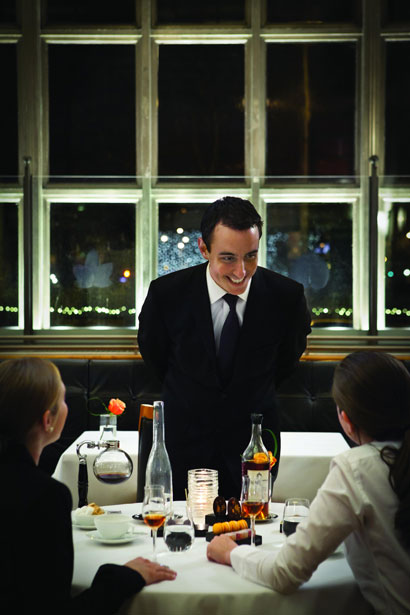
At your service: Will Guidara ’01 in the dining room at Eleven Madison Park.
What’s the opposite of resting on your laurels?
Will Guidara ’01 is general manager and co-owner of a restaurant that has received four stars from the New York Times and three from the Michelin Guide—the latter an honor held by just seven restaurants in New York and ninety-three around the world. The establishment, Eleven Madison Park, has won five James Beard Awards—the Oscar of the culinary world—since Guidara took the helm, including Outstanding Restaurant in America for 2011. This year it was named one of the ten best on the planet in the San Pellegrino World’s 50 Best Restaurants awards—leaping from number twenty-four to ten in a single year. Its reservation book, which opens at 9 a.m. exactly four weeks in advance, is generally filled by 9:15. Those who miss out can get on the waiting list—but it’s some 150 people long.
For many restaurateurs, it would be time to sit back, enjoy the accolades, and stop working so hard. Guidara and his partner, the Swiss-born chef Daniel Humm, decided it was the perfect moment to shake things up. Eleven Madison Park closed for the week after Labor Day—the downtime offered a chance for some cleaning, refurbishing, reorganizing, and redecorating—before reopening with a menu reimagined as a celebration of New York culture and cuisine. “The best meals, when you’re eating them, you know where you are; it wouldn’t even make sense if you were eating it anywhere else in the world,” says the thirty-two-year-old Hotel alum. “Going to the great sushi bars of Tokyo, having an amazing truffle dinner in Piedmont, having the classic three-Michelin-star French meal in Paris. We’re trying to make Eleven Madison Park a New York experience, one that expresses an amazing pride of place.”
The New York-centric menu the restaurant unveiled in September included such dishes as sturgeon presented under a glass dome filled with smoke, meant as a nod to the city’s “appetizing” lox-and-bagel shops. There were savory black-and-white cookies; a twist on cheesecake, served in a glass with raspberry gelée and chamomile sorbet; a tabletop “clambake” complete with hot rocks; a cheese course packaged in a basket—along with a pretzel with mustard and a bottle of ale custom-brewed by the Ithaca Beer Company—meant to evoke a picnic in Central Park. (In April, Ten Speed Press will publish I Love New York: A Moment in New York Cuisine, in which Humm and Guidara offer recipes and profiles of more than fifty farms.)
Eleven Madison Park has long been a high-end dining experience, but the change put it in even more rarified company. While it didn’t raise the price of its much-celebrated, fifteen- to sixteen-course tasting menu—it remains $195 per person, plus $145 for wine pairings—it did away with a more modest option, a four-course prix fixe meal at $125. (The prices and menu are the same at lunch and dinner.) On the bright side: even at nearly $200 a person, it costs about as much as an elegant dinner and a Broadway show—and at nearly four hours, the meal is the show. “There’s a narrative that starts from the second you open the door, that you’re being guided through an experience,” says Kevin Denton ’01, MRP ’04, the beverage manager at the Lower East Side molecular gastronomy restaurant WD-50 and a fixture on the city’s bar and restaurant scene. “Dining there feels at once like something new and something familiar. It employs multiple styles of cuisine and interprets it in many different ways. It’s playful, but at the same time you know how much discipline went into it, how many hands and hours it took to prepare.”
Denton has known Guidara since freshman year, when they lived in the Just About Music (JAM) program house. The band they formed as students, the Bill Guidara Quartet—it’s actually a funk act with about a dozen members; Guidara plays the drums—still does an annual New Year’s show. And music remains a lively force in Guidara’s professional life: Eleven Madison Park takes inspiration from the jazz of Miles Davis, with the kitchen decorated with his photo and a poster listing words (“cool,” “inspired,” “collaborative,” “spontaneous,” “endless reinvention”) that his music evokes. The NoMad—the boutique hotel that Guidara and Humm opened last year in a Beaux Arts former office building at the corner of Broadway and 28th Street—is similarly informed by the Rolling Stones. Its kitchen sports a Mick Jagger portrait and a word list that includes “loose,” “alive,” “glamorous,” and—naturally—“satisfaction.” “You think of the Stones as wild and crazy,” Guidara says. “But they were the most studied, contemplative, deliberate rock band I’ve ever learned about. When they were coming up in the U.K. they would buy every blues album that came out of America and learn every song, note for note—study it, break it down. And I like that—the idea that something is quote-unquote ‘chaotic,’ but nothing happens by accident. The word ‘deliberate’ is really important to me, in life and in work.”
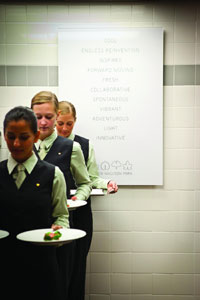
Eat your words: En route from the kitchen, servers pass a list of phrases that inform Eleven Madison Park.
The day after Labor Day, Guidara sits in the NoMad’s wood-paneled lounge; the room is styled as a library, complete with leather-bound volumes and a spiral ladder. Guidara and Humm were involved in designing every facet of the hotel, which has the air of an English club circa the Gilded Age. The bar is laden with dark wood and dominated by two carved elephants; the open kitchen sports a pressed-copper countertop. “About a century ago, back in the day in New York and London, the grand hotels—like the Waldorf and the Plaza—were the gathering places,” Guidara says. “Locals and visitors alike would be there. You’d know they had the best bar, the best dining, the best rooms. To me, there’s a sense of integrity that comes with that.”
The NoMad’s restaurant—which was awarded three stars by the New York Times in June—offers more casual and expansive interpretations of Eleven Madison Park’s fare. While one of the elder restaurant’s signature dishes is a whole roasted honey lavender Muscovy duck—dry-aged for two weeks and served with each meal as a course for the table—the favorite at NoMad is the “chicken for two,” a whole roasted bird with foie gras, black truffles, and brioche stuffed under the skin. “We wanted a place to express the other part of our personality,” Guidara says. “Eleven Madison Park is very high end. We wanted somewhere we could maintain the same standards but turn the music up—to create an à la carte restaurant that’s just as excellent as Eleven Madison Park but louder, looser, more fun. We want people to be able to dine here a few times a month as opposed to, over there, a few times a year.”
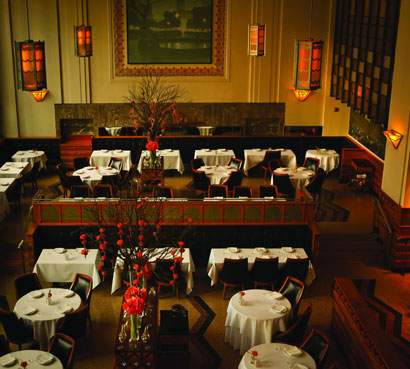
A bird’s eye view of the Art Deco-style dining room.
Given that Eleven Madison Park is about to launch its new format in just three days, Guidara seems remarkably calm. When he migrates over to the restaurant, just a few minutes’ walk to the other side of Madison Square Park, he encounters a noisy hive of activity; the brief closure has enabled such projects as reorganizing the tables, refinishing the bar, and cleaning the decorative fabric panels that dampen sound in the dining room. “I’m in love with this bar right now,” Guidara says as he runs a hand along its pristine surface. “They’ve sanded it down and put on new coats of polyurethane. It’s perfect.”
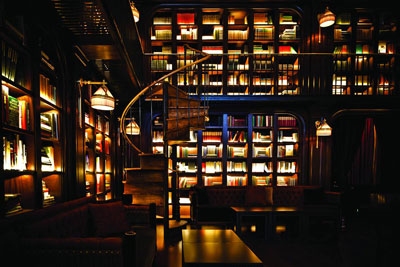
Mick and Miles: The NoMad Hotel, inspired by the music of the Rolling Stones, features a library themed lounge…
Over in the kitchen, Guidara encounters a trio of workers scrutinizing the lighting fixtures. “How many people does it take to clean these?” he jokes with them in Spanish. “Three?” On the way through a semi-public service area, he detours the long way around a central island even though there are boxes in the way; everyone at the restaurant is trained to walk a particular route to avoid collisions, and he can’t shake the habit. On the wall, in a corner, are frames displaying the James Beard Awards. “We have one more of those to go up,” Guidara says, by which he means Humm’s 2012 nod for Outstanding Chef. “In some restaurants they’re by the entrance, but I never wanted them in the dining room. It’s more for us. As we’re walking out of the kitchen carrying food, we’re reminded that we have a legacy to maintain.”
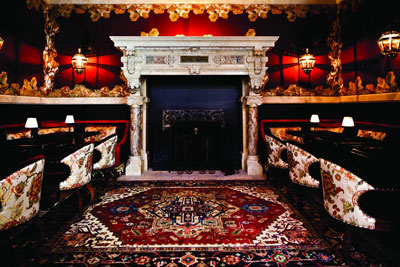
…and an ornate dining room.
For Guidara, restaurants are a legacy business. His father, Frank, is a longtime industry executive who has worked for Wolfgang Puck and headed Au Bon Pain; he currently serves as president and CEO of the parent company of Uno Chicago Grill. “I’ve wanted to do this since I was twelve,” Guidara says. “I’d go to work with my dad and I’d love it. Tons of kids like playing make-believe; I could do it for real. In restaurants, you’re creating a different world for people to walk into. I could put on an apron and be a part of it.” During the years when his father was an executive at Restaurant Associates—the industry behemoth that runs, among other things, the cafés at institutions like the Metropolitan Museum of Art—Guidara would head out with him at 5 a.m. for the two weeks of the U.S. Open tennis championship in Queens. “I’d get excited about waiting tables,” says Guidara, who grew up in the Hudson Valley and now lives in Manhattan’s Chelsea neighborhood. “I was the water boy, and I loved it. Later I was a soda jerk at Baskin Robbins, and I loved that too.”
Guidara got his first official restaurant job at fifteen, as a dishwasher at a Ruth’s Chris Steak House. He was quickly promoted to busboy; within a year he was a host. Guided by his father, his summer jobs during high school and college gave him a tour of the business, including work as a busboy at Puck’s legendary Spago in Beverly Hills and as a waiter at New York’s Tribeca Grill. “He was an extremely mature student for his age,” says his former adviser, Hotel school senior lecturer Giuseppe Pezzotti ’84, MMH ’96, who has brought his restaurant entrepreneurship class to Eleven Madison Park. “He had all the qualities of a successful restaurateur or hotelier. He was determined, focused; everything he does is methodical and organized. But he’s also a humble, compassionate, understated person. He can play in a band, serve a $1,000 bottle of wine, and design a hotel. That tells you the kind of human being he is.” Guidara went to Spain after graduation, earning room and board at a hotel school in exchange for working as a morning prep cook. “I’d gut fish and chop vegetables,” he recalls. “I’d been prompted by my dad to learn Spanish, which is very helpful in this business.”
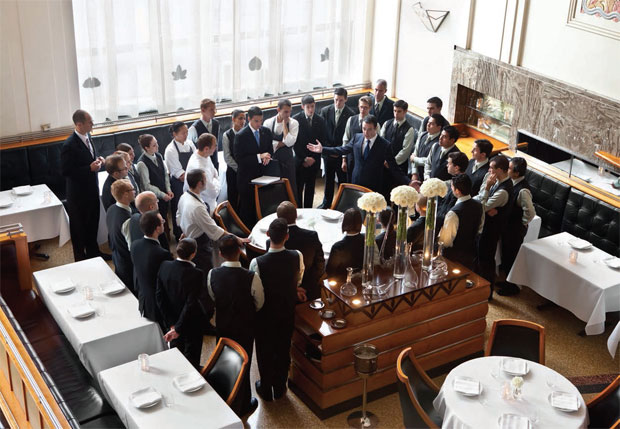
At Eleven Madison Park, inspired by Miles Davis’s jazz, the staff gathers for a meeting before each four-hour meal begins.
After returning home Guidara became the maitre d’ at Tabla; the tony Indian restaurant (which closed in 2010) was part of the Danny Meyer empire that includes Union Square Café and Gramercy Tavern. “That was the coolest,” Guidara recalls. “I was twenty-one years old. I got to wear a suit; I had my first business card; I was at the front door. But after two years my dad effectively made me quit. He said, ‘You’re too young to commit yourself to one approach to running a company, and you can’t just be in the dining room. You haven’t solidified your foundation.’ ”
So Guidara went to work for Restaurant Associates, working twelve-hour days that started at 5 a.m., doing purchasing, receiving, and bookkeeping for the restaurants in the MetLife building above Grand Central Station. “I went from what I considered to be the most glamorous job in New York to the least,” he says. “But I got to learn the business.” He went back to work for Meyer in 2004, helping to open the cafés at the newly renovated Museum of Modern Art. Then, in 2006, Meyer decided to overhaul Eleven Madison Park. “It had been open for eight years as an upscale brasserie,” Guidara says. “It was always very good, one of the most popular restaurants in New York, but after its second two-star review in the New York Times there was a desire to make it something more.”
Having recruited Humm as chef, Meyer tapped Guidara to manage the restaurant, but he balked. “I never wanted to have anything to do with fine dining,” Guidara says, smiling to acknowledge the irony. “I was always put off by the stuffiness of four-star experiences.” Guidara had his heart set on working with Meyer on expanding Shake Shack, his successful chain of burger joints—but his dad pointed out that when Danny Meyer asks you to help him reinvent a restaurant, there’s only one right answer. He agreed to work at Eleven Madison Park for a year, then move to Shake Shack; twelve months later he didn’t want to leave. “I realized it didn’t need to be super stuffy or pretentious,” he says. “By taking a slightly different approach to that style of service, it could be fun. It’s about surrounding yourself with good, honest people who value hospitality as much as they do excellence—and who, while taking what they do seriously, don’t take themselves as seriously.”
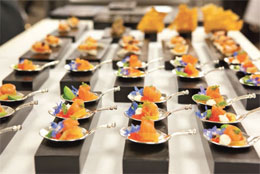
Tasting courses in the Eleven Madison Park kitchen await their servers.
While some restaurants ban substitutions and consider their dishes sacrosanct, Guidara and Humm take the opposite tack. For four of the tasting menu’s courses, guests choose among dishes denoted by their principal ingredient (such as beets, lobster, squab, parsnip, mushroom, and chocolate). “We go to the table and say, ‘Please select one course from each line and then tell us what you don’t like, what you’re allergic to,’ ” Guidara says. “Sometimes I have to lead the ordering process like an AA meeting and say, ‘My name is Will Guidara and I don’t like sea urchin. What don’t you like?’ ” And in contrast to, say, Anthony Bourdain’s open disdain for vegetarians—in Kitchen Confidential he called them “the enemy of everything good and decent in the human spirit”—Guidara sees special diets as more of a creative challenge than a massive drag. “We have a team of thirty cooks,” he says. “If they can’t figure it out, we have a problem. We’re changing the menu every day based on what’s available at the market anyway. If we’re as good as we’re supposed to be, we should be able to change it to suit a guest.”
In 2009, Eleven Madison Park got its fourth star from Times critic Frank Bruni, who praised it as “among the most alluring and impressive restaurants in New York.” That day, it did away with its dress code—and its high chairs. “We decided to become more accessible and less accessible in different ways,” Guidara says. “I just think there are some environments where people should be able to go and not risk hearing a screaming baby. That’s a controversial thing to say, but I believe those places should exist. I also believe there should be a four-star restaurant where you can wear jeans and a T-shirt.”
Last year was an eventful one for Guidara and Humm; in addition to opening NoMad and publishing Eleven Madison Park: The Cookbook, they bought the restaurant from Meyer. This fall, Eleven Madison Park and the much-heralded Chicago molecular gastronomy restaurant Alinea sparked a foodie frenzy when they swapped venues for five days. Tickets, which cost $495 per person, sold out in under an hour. Asked what he thinks people are seeking in an ultra-high-end dining experience, Guidara says that although the food is the obvious draw, it’s hardly the only one. “People spend that kind of money for a great meal, but they also want to be pampered, to feel cared for,” he says. “If you go to Eleven Madison Park, there’s one price. It doesn’t matter if you’re a billionaire or someone who has been saving up—that night, you’re equals.”
Porcini Salad with Autumn Greens and Peanuts
A recipe for the intrepid home chef
Eleven Madison Park: The Cookbook features dozens of recipes, organized by season, that reflect the nature of the restaurant’s cuisine—elegant and seemingly simple, but the product of complex, multi-step recipes. The following is one of the simpler dishes from its fall section. (Serves eight.)
| POACHED PORCINI ON BREAD ROUNDS
2 cups white wine |
In a medium saucepan, combine the wine, oil, vinegar, shallots, salt, peppercorns, cloves, and bay leaf. Reduce the wine for 5 minutes to cook out the alcohol. Add the porcini mushrooms and cover with a cartouche (lid made of parchment paper). Simmer for 20 minutes. Remove the mushrooms from the poaching liquid and drain them on paper towels. Cut the porcinis in half lengthwise.
Using a rotating deli slicer or a sharp knife, thinly slice the bread, about 1/8th inch thick, to yield at least 16 slices. Use a 3 ½-inch ring cutter to cut rounds from the slices. Beat the egg with 1 teaspoon water to make an egg wash. Dip the cut side of a poached porcini in the egg wash and adhere the porcini half to a bread round. Repeat with the remaining porcinis and bread rounds.
|
| CLARIFIED BUTTER
Makes 1¾ cups |
Place the butter in a medium saucepan over medium heat. Simmer for about 30 minutes. Once the butter is clear, strain through cheesecloth to remove milk solids. Refrigerate in an airtight container until ready to use, for up to 1 week.
|
| PEANUT PUREE
Makes 2 cups
|
In a food processor, puree the peanuts until they become a smooth peanut butter, about 5 minutes. Pass the puree through a fine-mesh tamis [sieve] and season with the salt. |
| PEANUT VINAIGRETTE
Makes 1 ½ cups
|
Whisk together the peanut oil and sherry vinegar.
Season with the salt. |
| PICKLED PORCINI MUSHROOMS
4 porcini mushrooms |
Use a mandoline to slice the porcini mushrooms paper thin (1/16th inch), yielding 24 slices total.Place the sliced mushrooms in a sous vide bag, add the Pickling Liquid, and vacuum-seal. Marinate in the bag for 30 minutes. Remove mushroom slices from the bag and dry on paper towels.
Alternately, bring the Pickling Liquid to a simmer in a small saucepan over medium heat. Place the porcini slices in a bowl. Pour the liquid over the mushrooms. Allow to come to room temperature before drying on paper towels.
|
| WHITE BALSAMIC PICKLING LIQUID
1¾ cups white balsamic vinegar
|
In a medium bowl, stir together 1 ¾ cups water and the vinegar. Add the salt, stirring until it dissolves. |
| TO FINISH
Poached Porcini on Bread Rounds Editor’s note: Orach is a relative of spinach. |
To toast the Poached Porcini on Bread Rounds, heat the Clarified Butter in a sauté pan over high heat. Place the porcini, bread side down, in the pan and quickly toast the bread until it is golden brown, 1 to 2 minutes. Remove immediately and place on paper towels. Work quickly but gently so that the porcinis stay glued to the bread.
Spread 1 teaspoon of the Peanut Puree on a plate. In a small bowl, toss the greens in the Peanut Vinaigrette and arrange 1 of each leaf on the plate. Place 3 raw porcini slices, 2 Pickled Porcini mushroom slices, and 2 toasted Poached Porcini on Bread Rounds on the plate. Dot with a few drops of Peanut Vinaigrette. Finish the plate with 1/8 teaspoon ground peanuts. Repeat with the remaining ingredients, to serve 8.
|
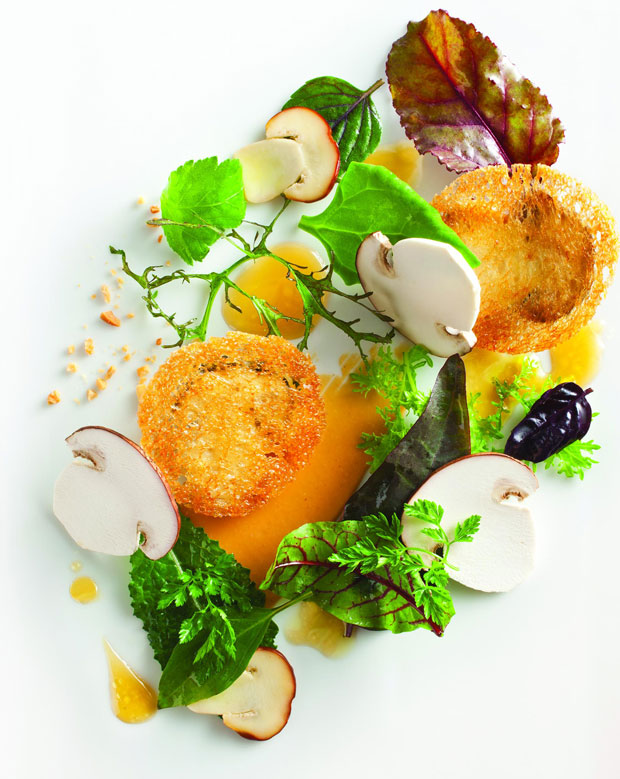
Excerpted from ELEVEN MADISON PARK: THE COOKBOOK by Daniel Humm and Will Guidara, published by Little, Brown, and Company. Copyright © 2011 by Daniel Humm and Will Guidara. Reprinted by permission. All rights reserved.


